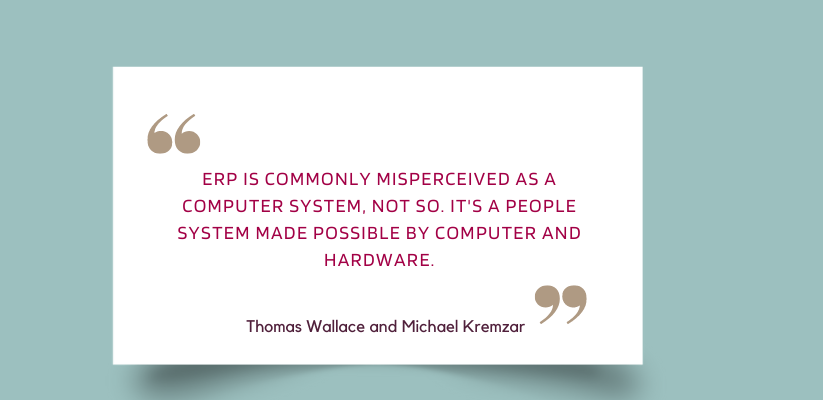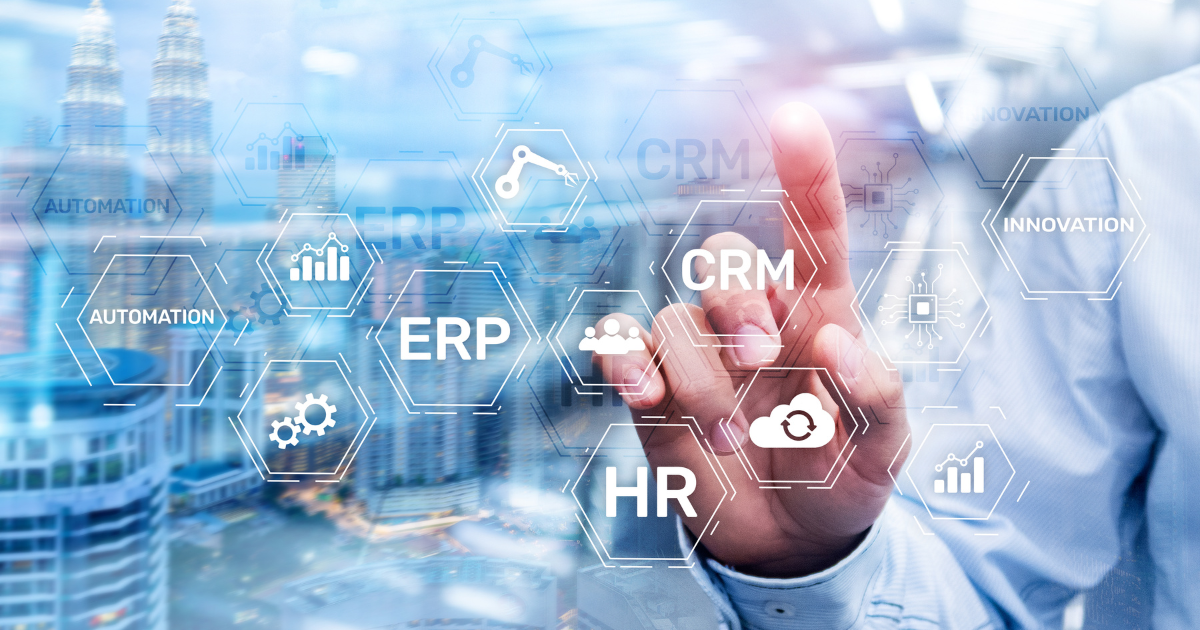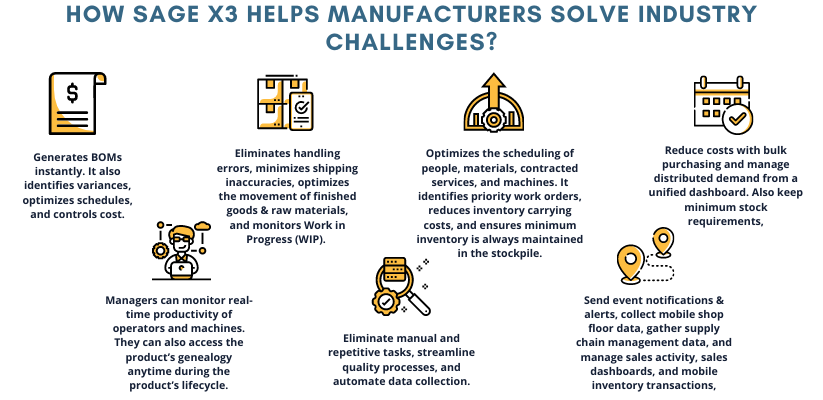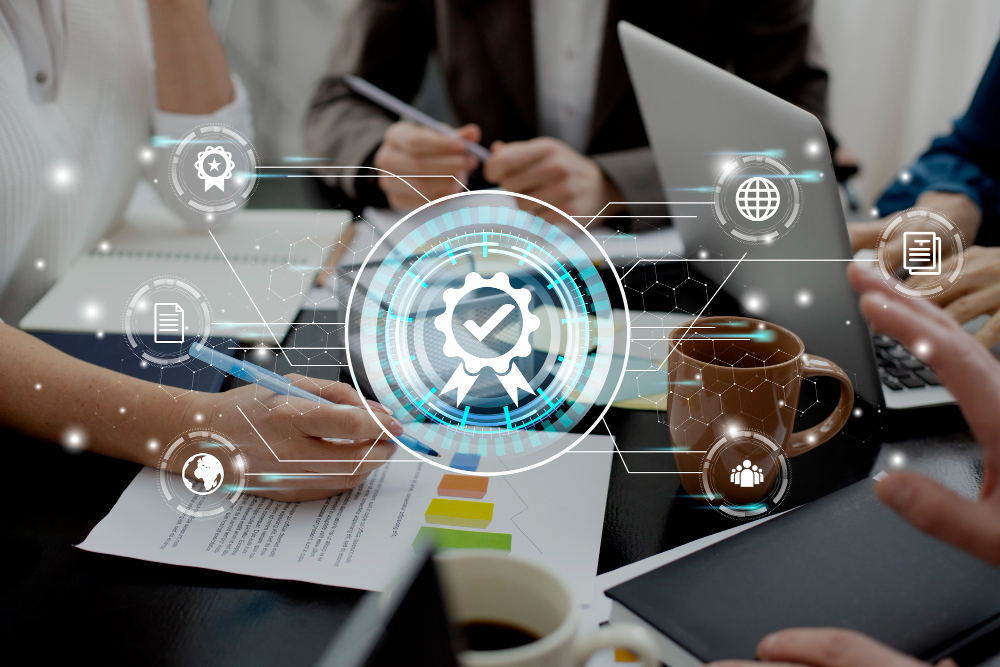Summary: ERP systems are boon to both SMEs and large-scale industries. Its advanced features give optimum growth results to a company. A study says that ERP implementation led to business process improvement for 95% of businesses. Industries that implemented ERP systems found tremendous growth and seamless flow of business processes.

An Enterprise resource planning (ERP) system is an advanced automated software to manage a company’s core business processes. It integrates and balances the flow of data and streamlines business operations across the enterprise. ERP ties the business processes like financials, supply chain, operations, commerce, reporting, manufacturing and human resources in a single database.
In short, ERP monitors and controls day-to-day business activities. Understand that ERP software coordinates processes and stores information silos for anyone to access data without any hassle. Earlier manual labour was time-consuming and pricy. Just imagine waiting for consent to access data and delays in data transfer from one department to another. So now the updated version of the ERP system is faster and the executives can save time to engage themselves in value-added tasks.
Earlier ERP system was complex, installed in different business departments separately and was not linked to a common database. The business system at that time lacked a balanced flow of operations thereby delaying the process.
The unique aspect of the current ERP system is its ability to coordinate data to a single system. Based on the data attained from the ERP system, you can get better insights to predict your company’s future. Modern ERP systems are more flexible providing secure options to encrypt confidential data.
History of ERP SYSTEM
In 1990, ERP systems were introduced chiefly for manufacturing industries. There are a few concepts which emerged from ERP systems at that time such as Materials requirement planning in 1964, MRP II developed in 1983, and Economic order quantity(EOQ) developed by Ford W Harris in 1913.
Later Gartner Group coined the term ERP system to distinguish it from MRP in the 1990s. According to QAD.Inc, ERP system started introducing business intelligence at this time. Additionally, it was handling other business processes like Sales Force Automation(SFA), marketing automation and e-commerce. Initially, there were shortcomings in using an on-premise ERP system. The limitations included the heavy cost of implementation, long duration to implement, licensing and many more. So the vendors began developing cloud-based ERP systems using the Saas service. Saas ERP systems are comparatively cheaper and the user has to pay monthly subscriptions. The striking feature of this feature is that it can be customized based on industry-specific requirements suiting businesses of all sizes.
Types of ERP systems
There are three types of ERP Modules – On-premise ERP, Cloud ERP and Hybrid ERP
On-premise ERP software
- Implemented on-site, in the physical office of an organization.
- The company takes on full control, support and ownership after its implementation.
Cloud-based ERP software
- It’s a web-based solution known as Software as a service (Saas).
- This ERP is purchased and used subscription-wise.
- An internet connection is required to access and store data. Data can be stored in repositories.
- The software provider sends updates and provides flexible solutions/customizations based on users’ needs.
Hybrid ERP software
- It’s a combination of On-premise ERP software and Cloud ERP software.
- Organisations with an established on-premise ERP software opt to implement this type.
- The benefit of implementing both is to reduce costs and quickly move to meet local needs.
- It is also known as a two-tier ERP system.
Features of Enterprise resource planning software
- Integrates the entire business operations to streamline information and processes across the entire organisation.
- ERP features are beneficial for all the departments like HR, sales, logistics, manufacturing etc.
- It has the ability to manage multiple projects simultaneously.
- The more features the company adds to ERP, the more expensive it becomes.
- ERP features are expansive.
<<<Also read: The vital role of ERP in Manufacturing Industry>>>
Benefits of an Enterprise Resource Planning (ERP) System
Enterprise resource planning (ERP) is implemented in the company to expand or reduce costs or to maintain the smooth flow of business operations. But there are more advantages to employing an ERP system in the company.
Boosts accuracy and productivity
- Modern ERP system link all the major business processes. This promotes data accuracy and productivity.
- As the processes are interconnected, the users can synchronise and work to get faster outcomes.
Improved business reporting
- ERP system helps in real-time data recording. It also helps in making better decisions to eliminate risks.
- Accurate data from multiple business departments aids to plan, budgeting, and forecast business decisions that help the shareholders to make precise decisions.
Increases Efficiency and seamless workflow
- Data can be accessed quickly to present to the customers, vendors or business partners.
- Employee and customer satisfaction will improve because of the quick response.
- Most importantly unwanted expenses can be terminated.
- It also improves the collaboration of the different departments.
Importance of ERP Software
Enterprise resource planning ERP system has vast significance across the industry.
- A single system(interface) that coordinates all the business operations.
- Users can interact with a single interface and share information.
- Enable cross-functional collaboration which increases efficiency and productivity.
- Helps in reducing operational costs.
- ERP systems are modular design, flexible, open and centralized database.
ERP for Enterprise application
ERP is entirely for enterprise applications for both large and small businesses. For large-scale businesses, a dedicated team is needed to manage the deployment, customization and updates and to analyze data. Small businesses use lighter ERP business applications customized to the needs of their business type.
Most of the industry uses ERP systems because its more reliable, efficient and productive. At the same time, there is no alternative to this. A firm implements an ERP system to replace their out-of-date ERP software, homegrown ERP system, Accounting software, or had no ERP system and many other reasons.
Application of an ERP System for an organisation
ERP system has multiple benefits for an organisation. It’s crucial to know the specific areas where it is utilised or how it’s useful. In detail go through the following details.
Finance
The general ledger will be maintained digitally. Accounts payable and accounts receivable will be registered. So the executives will have an accurate record of all the company’s finances.
Record all the purchases
All the purchases done in the company can be automated and recorded. Request for quotes can be sent to the vendors from the ERP system.
Customer Relationship Management
CRM features are a significant component of an ERP system. Firstly, in the distributor’s site, the prospects can fill out the application. In the second step, the executive can collect customers’ information for future analysis.
Project Management
It’s a highly valuable feature of an ERP system. Any users will have the access to view the project status, billing information, expenses and client communications.
E-commerce
ERP tool modules aid in adding and updating products to the company’s e-commerce site. Other e-commerce tools like order information, stock management and others are also available.
What Industries can benefit from ERP?
ERP software can be used in any industry and for businesses of any size. It only helps industries to become efficient and productive. ERP software aids in managing and transferring information across an industry. They help to manage everyday business activities and help to combat the challenges and complexities that come with when running a company. ERP system help in managing projects, tracking compliance to guidelines and handling many other functions. Note that it is easy to acquire customized ERP features based on the type of your business.
Understand that ERP’s origin roots back to the industry, so it’s best suitable for the manufacturing industry. Some of the examples of Industry which the ERP is catering to are: Manufacturing, Automotive, Electronics and Technology, Food and beverage, health care and hospitality, garment industry and many more.
ERP software presently has started to support applications that support everyday business functions. Business functions such as Financial accounting, Management accounting, Human resources, manufacturing, order processing, supply chain management, project management, customer relationship management and data services are the functions that ERP modules support.
<<<Also read: Why ERP is important in 2022?>>>
Examples of ERP Software
There are a lot of ERP systems available in the market. It becomes confusing to choose the right one tailored for your company. Sage ERP is one of the leading software used for large, medium and small scaled industries. Sage X3 and Sage 300 are undoubtedly the best software in the market today.
Sage X3
Sage X3 is a fully integrated and comprehensive suite of features to manage all business functions. It is more flexible and agile in controlling and managing day-to-day business activities. Sage X3 can be tailored to suit your business requirements. It is a silo of carefully curated features to match different businesses. Financials and Accounting, inventory and warehouse management, purchasing, reporting and analytics, and CRM are some of the major features offered by Sage X3 to support your business. Add-on features are also more so that the clients can choose based on the requirements. Sage ERP providers will continue to support it even after its implementation. Sufficient training is also given to the employees interacting with the software.
ERP software implementation is a boon to the industry. It promotes better inter-departmental communications, reduces costs, faster task completion, better planning and data security. It can also be customized based on the requirements placed by the company. You should immediately implement ERP if your business isn’t growing or if you are not getting enough customers. Initially, the cost of implementing ERP will be expensive, but in the long run, it will help businesses to save a lot of money. Choose the right ERP and increase your profit margin, productivity and growth.
Sage Software Solutions is a leading IT company with an array of advanced ERP Software solutions. Our proprietary products — Sage X3 and Sage 300 will help you cut your operational expenses, improve business productivity, increase operational efficiency, forge robust customer relationships, and strengthen association with vendors, suppliers, and distributors. So, if you are looking to reinforce your business fundamentals and emerge as an industry leader, then please schedule a call with one of our sales representatives.





